

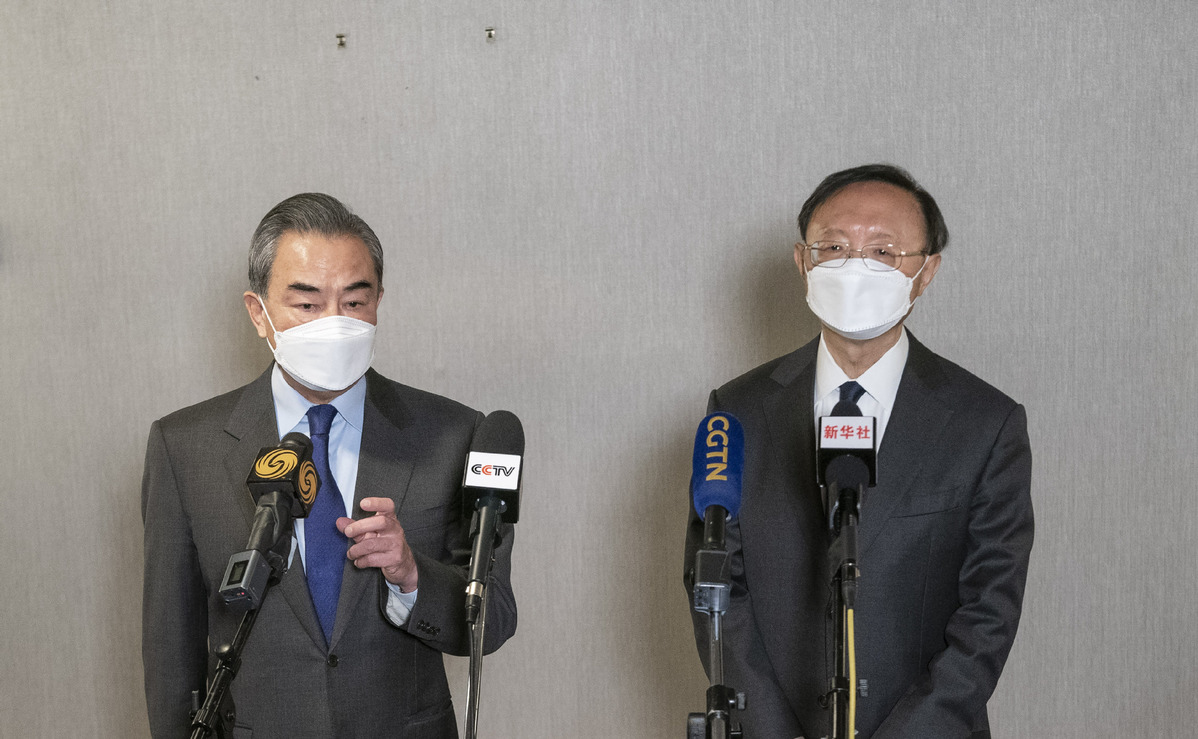
Beijing and Washington gain deeper understanding of each other's concerns
The recently concluded two-day high-level strategic dialogue between Beijing and Washington was constructive, helped bolster mutual understanding and was a promising signal for a global recovery, with the long-awaited gathering touching on an expansive agenda and yielding fresh consensus, officials and Chinese scholars said.
Both sides agreed to maintain dialogue, roll out cooperation and avoid misjudgment and confrontation, and they "both expect this kind of high-level strategic communication to continue", according to a statement released by the Chinese delegation after the talks, held on Thursday and Friday in Anchorage, Alaska.
As a promising sign for keeping ties from worsening, the two sides discussed arranging COVID-19 vaccination for each other's diplomats, adjusting visa and travel policy based on the evolving pandemic and normalizing the exchange of visits.
In particular, the two countries said they are committed to increasing communication and cooperation in the field of climate change, deciding to "set up a joint working group on climate change", the release said.
They outlined topics for future discussions, including facilitating the operations of each other's diplomatic missions and media reporters, as well as multilateral events such as G20 and the Asia-Pacific Economic Cooperation forum.
At the dialogue venue, the Chinese delegation was led by Yang Jiechi, a member of the Political Bureau of the Communist Party of China Central Committee and director of the Office of the Foreign Affairs Commission of the CPC Central Committee, and State Councilor and Foreign Minister Wang Yi.
United States Secretary of State Antony Blinken and National Security Advisor Jake Sullivan represented Washington at the dialogue.
Yang Jiechi told reporters upon the event's conclusion that the dialogue was "candid, constructive and helpful", though there are still some important differences between the two sides.
He said China will firmly safeguard its national sovereignty, security and development interests, and the two sides should handle relations in the spirit of nonconflict, non-confrontation, mutual respect and win-win cooperation, so as to move forward the bilateral relationship on a sound and stable track.
Wang, the state councilor, said "the door for China-US dialogue would be always open", if the US could work toward the same goal as China and respect each other's core interests and major concerns.
A dialogue must be based on mutual respect, and only one side of the two parties should not come up with a long list for bargaining, Wang added.
Ruan Zongze, vice-president of the China Institute of International Studies, said the latest dialogue was "timely, expansive in agenda and adequate in the length of time for talks," given the huge needs from both sides to communicate and to fix damage triggered by the previous US administration.
It is also a positive sign that both sides expressed their readiness to continue this kind of high-level strategic contact, Ruan said, noting that through the dialogue, the two sides have enhanced mutual understanding and identified areas for cooperation, such as establishing a joint working group on climate change.
Ruan noted that during the dialogue, the Chinese side actually "drew a red line for China-US relations, thus helping reduce strategic miscalculation", as it laid out its principles and positions clearly and firmly, particularly its firm opposition to US interference in China's internal affairs.
Wang Fan, vice-president of China Foreign Affairs University, said that the high-level strategic dialogue was a key step to realizing the consensus reached by the two heads of state during their phone call last month, noting that "the strategic guidance offered by the two heads of state is very important".
Despite the exchange of harsh words at the beginning of the dialogue, the officials' interactions behind closed doors were rational and smooth in general, and the communication proved effective, Wang noted.
"Dialogue is better than confrontation, and such a dialogue itself means a positive impact," Wang said.
The China-US ties are win-win in nature as "most US enterprises operating in China continued to make profits in the past few years "and some even increased their investment, Wang said.
The two sides share a great spectrum for cooperation, including in combating COVID-19, economic recovery and climate change, and of course, such cooperation must be two-way, win-win and should address the concerns of both sides in a balanced manner, Wang added.
During the dialogue, Beijing voiced its sincerity in accepting the US invitation for dialogue, explained its future plans for growth and the CPC's leading role, laid out views on multilateralism and highlighted the win-win nature of China-US ties.
The Chinese delegation also made clear that there will be no concession on the Taiwan question, that the US should stop interfering in China's domestic affairs, including those related to the Hong Kong Special Administrative Region, the Xinjiang Uygur autonomous region and the Tibet autonomous region.
Diao Daming, an associate professor of US studies at the School of International Studies of Renmin University of China, said such a dialogue is indispensable for two major countries that "have certain differences and must cooperate with one another".
China's serious response to unfounded accusations made by the US officials at the dialogue's opening served national interests and "helped bring the dialogue back to the right track". No dialogue can be a success without mutual respect and the spirit of seeking common ground while shelving differences, Diao said.
During the dialogue, the Chinese side elaborated on its way of rolling out governance and its determination to continue on its own development path, which "will help deepen the US side's understanding of its counterpart", Diao said.
Washington should realize that US values do not mean international values, and the rules formulated by the US and some other countries are not necessarily international rules, Diao added.
Wang Dong, a professor of US studies at the School of International Studies at Peking University, noted that at the dialogue's opening, the Chinese side named some prominent problems in the US, including racial discrimination against ethnic minorities. The US side also recognized its own problems.
"Through a fierce clash of views, a better understanding was underway. This is perfect for a case study in diplomacy," he said.
Promoting the healthy and stable development of China-US relations is the shared aspiration of the two peoples and the international community, and China and the US should join hands in advancing their relations and safeguarding peace and stability in the Asia-Pacific region, Wang said.
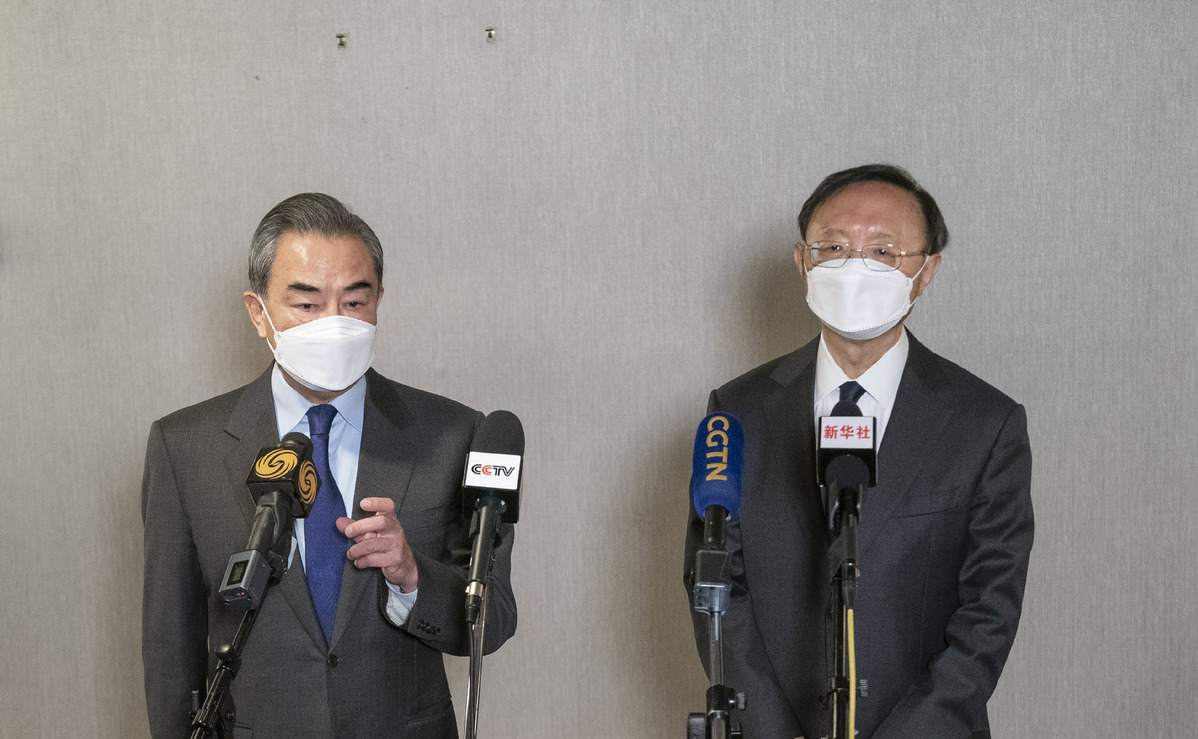
Beijing and Washington could work together on combating COVID-19 pandemic and other most pressing tasks facing the world, and develop a relationship featuring mutually beneficial cooperation rather than zero-sum competition, senior Chinese diplomats said at the first China-US high-level strategic dialogue that concluded Friday.
The world's top two economies could cooperate on COVID-19, climate change and world economic recovery, the three most demanding tasks for the international community, and ramp up communication and coordination on major global and regional issues for the benefits of the two peoples and the rest of the world, the Chinese side said in a statement after the two-day talks.
It said that such cooperation should go in two ways and be mutually beneficial, addressing the concerns of the two sides in a balanced way.
The dialogue was held between Yang Jiechi, a member of the Political Bureau of the Communist Party of China Central Committee and director of the Office of the Foreign Affairs Commission, State Councilor and Foreign Minister Wang Yi, and US State Secretary Antony Blinken and National Security Advisor Jake Sullivan.
It was a follow-up to the first phone call by the presidents of the two countries about a month ago, and also the first face-to-face meeting between the two sides since US President Joe Biden took office in January.
The two-day dialogue was "candid, constructive and helpful", though there are still some important differences between the two sides, Yang told reporters as the event wrapped up Friday noon.
He said China will firmly safeguard its national sovereignty, security and development interests, and China's development and growth is unstoppable.
The two sides should handle China-US relations in the spirit of non-conflict, non-confrontation, mutual respect and win-win cooperation, so as to move forward the bilateral relationship on a sound and stable track.
During the dialogue, the Chinese side also said the essence of China-US relationship is mutually beneficial cooperation instead of zero-sum contest, and the two countries will not necessarily end up with posing a threat to each other.
Blinken said US relationship with China will be "competitive where it should be, collaborative where it can be, adversarial where it must be", while Sullivan said that the US didn't want "conflict" but welcomes "stiff competition".
In its statement, the Chinese side said the difference and disagreement between the two countries should not be the ground for confrontation, as confrontation or conflict would lead to outcome that is beyond what either of the two could bear.
"The two countries need to build trust rather than second-guess each other; understand rather than blame each other, work together rather than undermine each other, so as to make sure they could both focus on their own domestic agenda, and attain their respective development goals," the statement read.
Blinken said after the meetings concluded that the US side was able to have a "very candid" conversation over the many hours in the two days on an expansive agenda. "On Iran, on North Korea, on Afghanistan, on climate, our interests intersect".
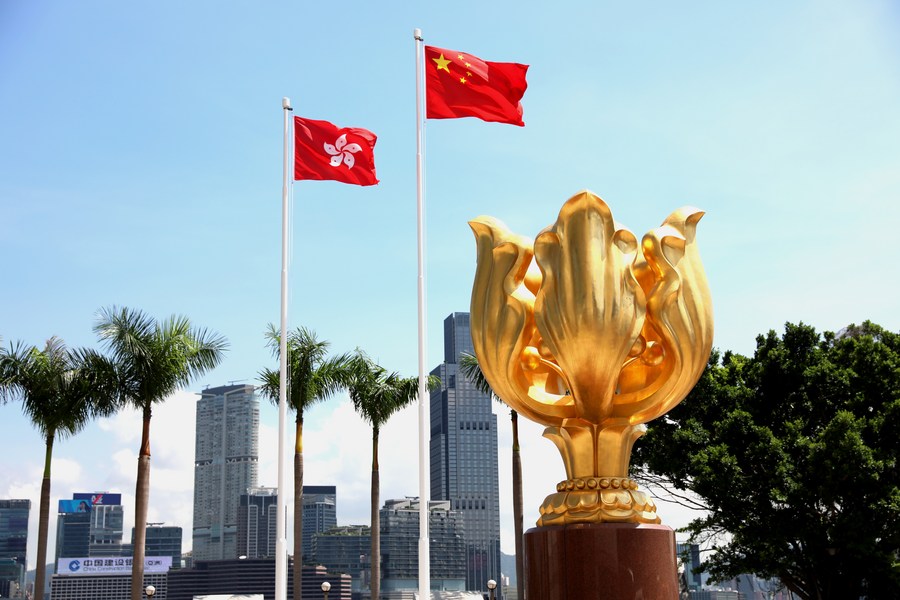
ANCHORAGE - The United States should stop meddling in China's domestic affairs including Hong Kong, said the Chinese delegation on Friday following a China-US high-level strategic dialogue here.
The electoral system in the Hong Kong Special Administrative Region is a local electoral system in China, and how to design, develop and improve it is China's domestic affair, the delegation said, adding that no foreign government, organization or individual has the right to interfere.
Improving HKSAR's electoral system must follow the principle of "patriots administering Hong Kong," it said, urging the United States to abide by international law and the basic norms governing international relations, respect the decision of China's National People's Congress on improving Hong Kong's electoral system, and stop supporting "Hong Kong independence" forces.
It also called on the US side to revoke illegal sanctions against Chinese officials and institutions, stop trying to mess up Hong Kong again, and cease forestalling China's implementation of "one country, two systems."
If the United States continues to go its own way, China will make firm responses, the delegation said.
The two-day dialogue marked the first high-level contact between the two countries after Chinese President Xi Jinping and his US counterpart, Joe Biden, had a phone call on the eve of the Chinese lunar new year, and the first face-to-face talks between high-level officials of the two sides since Biden took office in January.

ANCHORAGE - The claim that there is genocide in China's Xinjiang is the biggest lie of the century, said the Chinese delegation on Friday following the end of the China-US high-level strategic dialogue in Anchorage, the US state of Alaska.
The Chinese side is ready to engage in exchanges with the US side on the basis of mutual respect, and the door of Xinjiang is wide open to the world, said the delegation.
However, China will not accept any investigation in Xinjiang based on the presumption of guilt by those who are biased and condescending, and who want to lecture China, it said.
It is hoped that the US side can respect facts, call off attacks against and smearing of China's Xinjiang policy, and abandon double standards on anti-terrorism, it added.
The two-day dialogue marked the first high-level contact between the two countries after their heads of state had a phone call on the eve of the Chinese lunar new year, and the first face-to-face talks between high-level officials of the two sides since US President Joe Biden took office in January.
ANCHORAGE, the United States - The China-US high-level strategic dialogue was candid, constructive and helpful, though there are still some important differences between the two sides, said Yang Jiechi, a senior Chinese official, here on Friday.
Noting that he and Chinese State Councilor and Foreign Minister Wang Yi had a long strategic communication with US Secretary of State Antony Blinken and US National Security Advisor Jake Sullivan in the past two days, Yang, a member of the Political Bureau of the Communist Party of China (CPC) Central Committee, said the two sides had candid and constructive exchanges on their domestic and foreign policies and bilateral relations.
The dialogue is helpful and conducive to enhancing mutual understanding, said Yang, also director of the Office of the Foreign Affairs Commission of the CPC Central Committee.
Noting that the communication was aimed at implementing the consensus reached by Chinese President Xi Jinping and US President Joe Biden in their phone talks in February, Yang said China hopes that the two sides will strengthen communication, exchange and dialogue in various fields.
The two sides should handle China-US relations in the principles of non-conflict, non-confrontation, mutual respect and win-win cooperation, so as to move forward the bilateral relationship on a sound and stable track, Yang said.
Noting that the Chinese side came to the dialogue with sincerity, Wang said that dialogue is always better than confrontation.
However, any dialogue has to be conducted with the spirits of mutual respect and seeking common ground while reserving differences, instead of one side unilaterally drawing up a list or gouging price, Wang added.
Both sides have many concerns, Wang said, adding that some of their doubts can be eased through dialogue, while some long-existing problems can be managed through dialogue.
The Chinese side also made it clear to the US side that sovereignty and territorial integrity are major issues of principle, said Wang, stressing that the US side should not underestimate China's determination to safeguard its sovereignty, security and development interests, nor should it underestimate the Chinese people's will to safeguard national dignity and legitimate rights and interests.
China's attitude towards developing the China-US relationship is clear and consistent, Wang said, expressing hope that the United States will meet China halfway, and in particular, the two sides should respect each other's core interests and major concerns.
It is upon that basis that the door for China-US dialogue would be always open, he said.
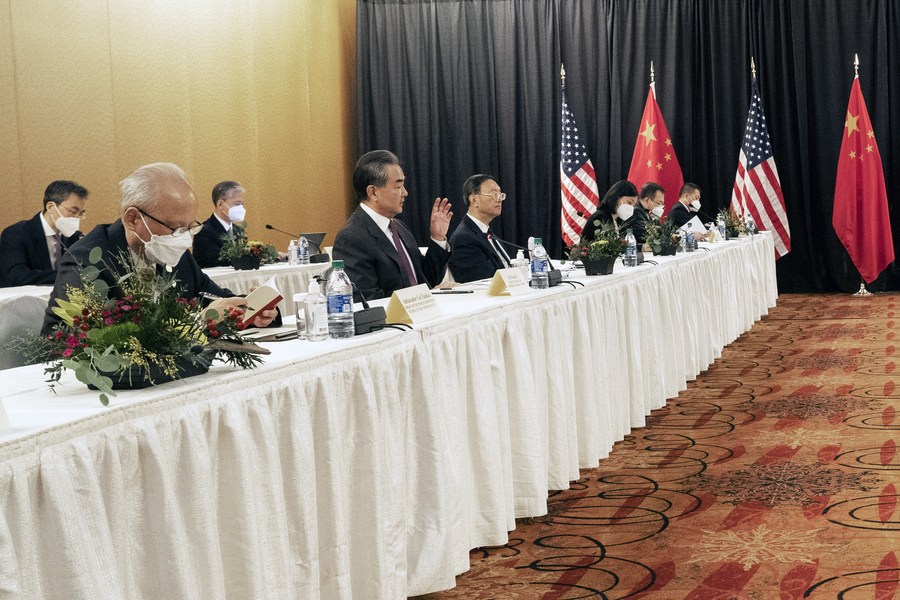
ANCHORAGE, the United States - China still hopes that the United States will meet China halfway, and in particular, the two sides should respect each other's core interests and major concerns, Chinese State Councilor and Foreign Minister Wang Yi said on Friday.
It is upon that basis that the door for China-US dialogue would be always open, he said.
The Chinese side also made it clear to the US side that sovereignty and territorial integrity are major issues of principle, said Wang, stressing that the US side should not underestimate China's determination to safeguard its national sovereignty, security and development interests, nor should it underestimate the Chinese people's will to safeguard national dignity and legitimate rights and interests.
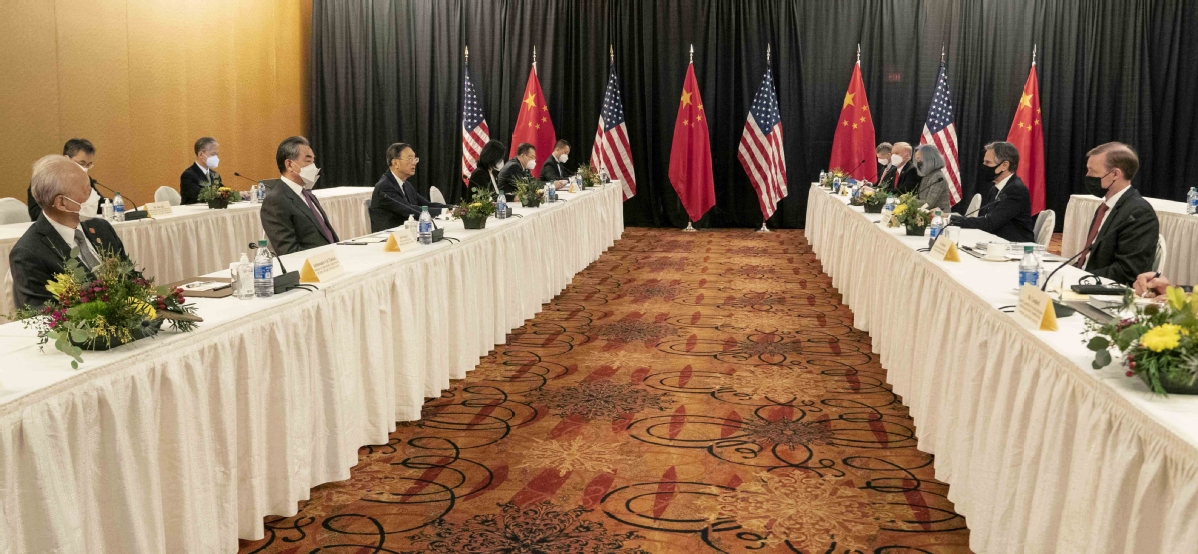
Senior diplomat says bilateral relations should be based on working together
The United States does not have the qualification to be "condescending" when speaking to China as the Chinese people will never accept this, and the US should work together with China and avoid confrontation, senior diplomat Yang Jiechi said.
Mutual respect is a basis for dealing with China, said Yang, a member of the Political Bureau of the Communist Party of China Central Committee and director of the Office of the Foreign Affairs Commission of the CPC Central Committee, at the bilateral high-level strategic dialogue in Anchorage, Alaska, on Thursday (local time).
The opening of the dialogue, covered by media from the two countries, witnessed a rare exchange of harsh remarks between the two sides.
US Secretary of State Antony Blinken and US National Security Advisor Jake Sullivan made unreasonable attacks on China's domestic and foreign policies, including human rights and issues related to the Xinjiang Uygur autonomous region, Hong Kong and Taiwan.
In response, Yang said that history will prove that any attempt to suppress and contain China "will backfire in the end".
The US has yet to deal with its own human rights and other problems, and should stop finger-pointing over China's human rights and democracy, Yang said.
"I don't think the overwhelming majority of countries in the world would recognize the universal values advocated by the US or that the viewpoint of the US could represent international public opinion," he added.
Confrontation with China does not serve the US well, while the two countries have achieved a lot together since they established diplomatic relations, Yang said, and urged Washington to ramp up communication and tackle differences.
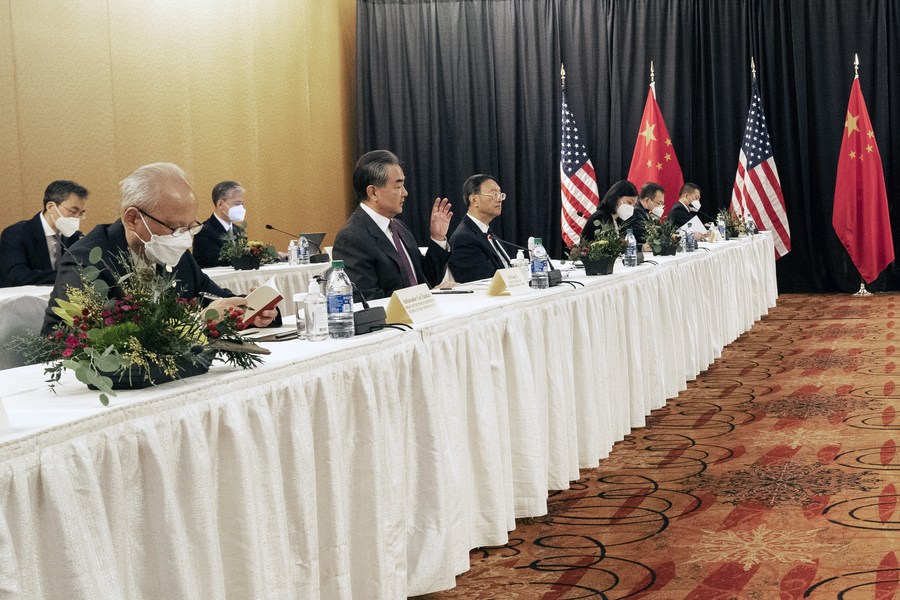
Sitting next to Yang, State Councilor and Foreign Minister Wang Yi followed up and rebutted Blinken and Sullivan's claims that China engages in "military coercion" with regard to US allies.
Washington should figure out if these claims were real and direct complaints from US allies, or are they just part of the US' own view, Wang said.
If the US indiscriminately believes those countries just because they are allies and even speaks up for their wrong words and deeds, then it will be very difficult for international relations to develop properly, Wang said.
"Who is coercing whom? I think history and the international community will come to their own conclusions," he added.
Prior to the Chinese delegation's departure for Alaska, Washington updated its sanctions regarding Hong Kong earlier this week.
"This is not supposed to be the way to treat guests," Wang said, adding that this is a "sheer miscalculation and only reflects vulnerability and weakness inside the US" if it attempts to gain some advantage in dealing with China.
The international community is closely following the dialogue and is watching whether the two countries will demonstrate goodwill, sincerity and send out a positive signal to the world, Wang added.
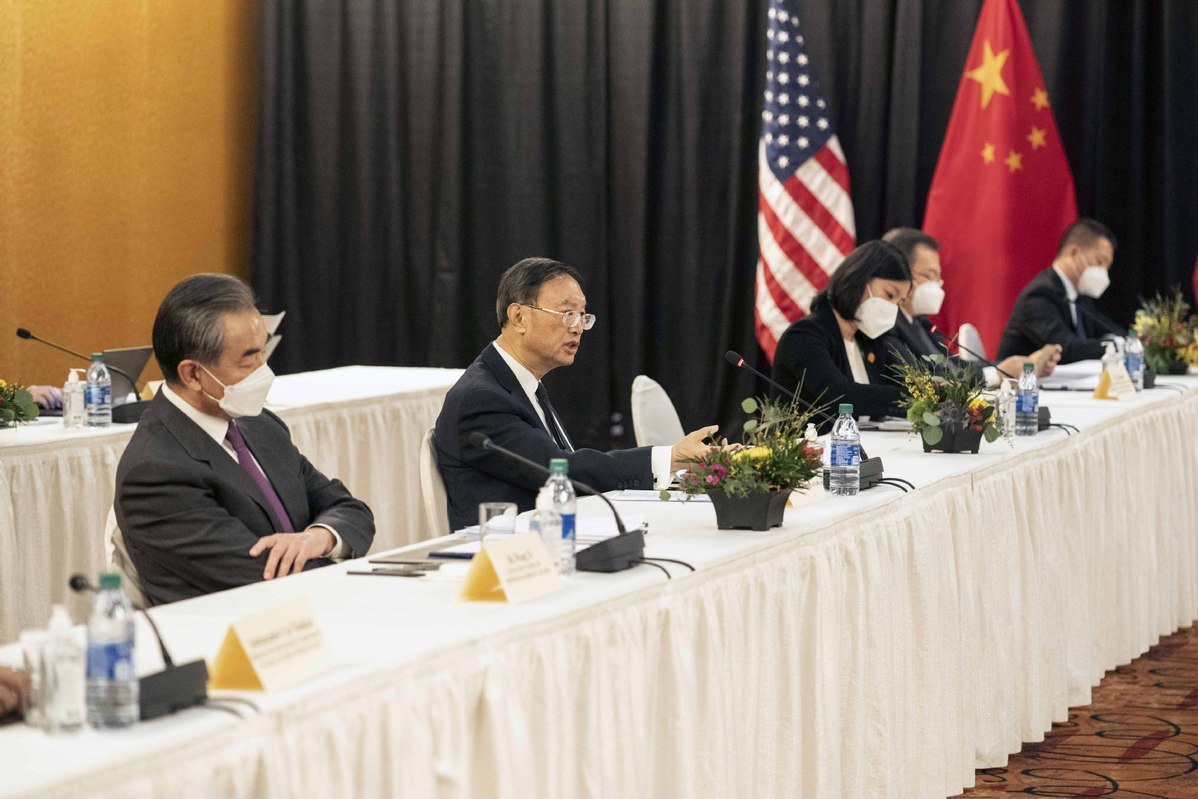
An official with the Chinese delegation told reporters on the sidelines that the US attacks at the opening of the dialogue mark an attempt to spur conflict, and this is "not in line with diplomatic etiquette and protocols".
Responding to the US invitation, the Chinese delegation traveled to Anchorage with sincerity and finished preparations for the dialogue in accordance with the procedures and arrangements that were agreed in advance by the two sides, the unnamed official said.
Foreign Ministry spokesman Zhao Lijian said it was the US side that picked the fight, leading to the dramatic exchange of strong words at the opening of the dialogue, which Beijing did not expect in the first place.
"We hope that the US side can move toward the same goal with China, honor the spirit of the phone conversation (last month) between the two heads of state, focus on cooperation, manage and control differences, and promote the healthy and stable development of China-US relations," Zhao said at a daily news conference in Beijing on Friday.
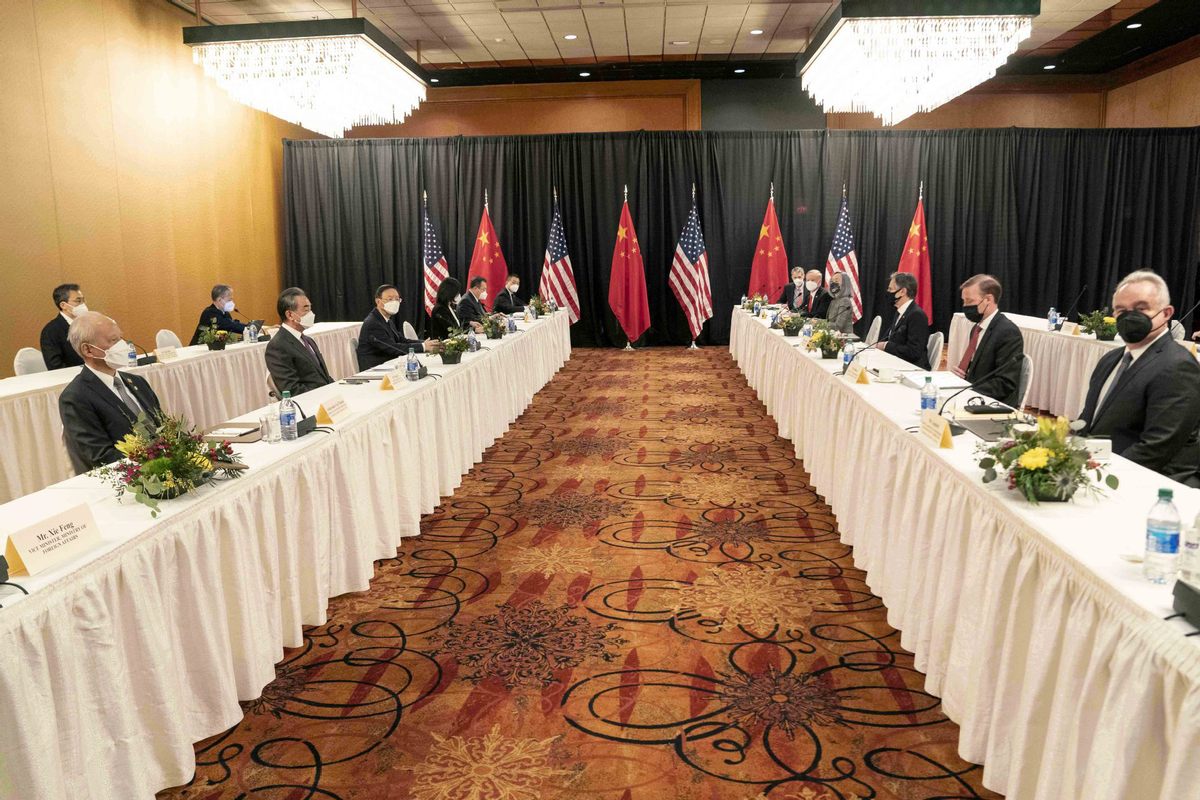
Beijing's top diplomat Yang Jiechi was bluntly sharp and unambiguous in his first vis-à-vis with senior US officials on Thursday: Don't speak to China in a condescending way, or seek to strangle the Chinese people, but work together and avoid confrontation.
Yang, a member of the Political Bureau of the Communist Party of China Central Committee and director of the committee's Office of Foreign Affairs Commission, along with State Councilor and Foreign Minister Wang Yi, met top US diplomat Antony Blinken and National Security Advisor Jake Sullivan for the first time in the Biden presidency.
Yang said at the start of his opening remarks that he hoped the dialogue will be a sincere and candid one, as it is a follow-up on the common understanding of the two presidents reached during their phone conversation about a month ago, and people hope to see practical outcomes from the dialogue.
The dialogue was scheduled to have three rounds of talks through Friday following a supposed brief opening session shortly after Thursday noon.
The tone of the US side in the opening remarks, however, prompted Yang, a former Chinese ambassador to the US, to expound China's position in an extended speech.
Blinken, who ordered sanctions on China over Hong Kong issue just two days before the meeting, talked about US "deep concerns with actions by China, including in Xinjiang, Hong Kong, Taiwan", and other areas – actions which he accused "threaten the rules-based order that maintains global stability".
Sullivan went further in his opening remarks, accusing China has undertaken an "assault on basic values".
Yang said Xinjiang, Tibet, and Taiwan are an inalienable part of China's territory, and China staunchly opposes US interference in its internal affairs. He warned that the country will take "firm actions" in response to any such interference.
"I don't think the overwhelming majority of countries in the world would recognize that the 'universal' values advocated by the US or that the opinion of the US could represent international public opinion," Yang said.
Those countries would not recognize that the rules made by a small number of people would serve as the basis for the international order, he said through an interpreter.
"What China and the international community follow or uphold is the United Nations-centered international system and the international order underpinned by international law, not what is advocated by a small number of countries of the so-called 'rules-based' international order," he said.
Unlike the US, whose arbitrary use of force has caused turmoil and instability in the world, China has followed a path of peaceful development, making "tireless efforts" to contribute to the world peace and growth, and to upholding the purposes and principles of the UN Charter.
The US has yet to deal with its own human rights and other problems and should stop finger-pointing over China's human rights and democracy, Yang said.
"The United States does not have the qualification to speak to China in a condescending way," he said. "The Chinese people do not buy it" – a colloquial saying that was translated at the scene as "This is not the way to deal with the Chinese people."
If the US wants to deal properly with the Chinese side, it should proceed from the basis of mutual respect, Yang noted.
Blinken said the US relationship with China will be "competitive where it should be, collaborative where it can be, adversarial where it must be", while Sullivan said that the US didn't want "conflict" but welcomes "stiff competition".
China and the US have had confrontations in the past, while China has pulled through the situation, the result of confrontation did not serve the US well, according to Yang.
The senior diplomat said the two countries have achieved a lot together since they forged diplomatic relations, thanks to the concerted efforts of the people with vision of both countries.
With great changes taking place in the world and under the new circumstances, Beijing and Washington need to ramp up communication, properly manage their differences, and expand cooperation instead of engaging in confrontation, he said.
History will show that one can only cause damage to himself if he wants to strangle or suppress the Chinese people, he said.
Yang listed fight against the COVID-19 pandemic, restoring global economic growth and climate change as areas for the two countries to work together and where their interests converge.
In his opening remarks, State Councilor and Foreign Minister Wang Yi denounced the latest US sanctions, which was announced just before the Chinese delegation, at the invitation of the US side, departed to the US for the dialogue.
"This is not supposed to be the way one should welcome his guests," Wang said, adding that if that was a decision made by the US to try to gain some advantage in dealing with China, it would be a miscalculation, only to expose the vulnerability and weakness inside the US.
Commenting on some countries' claim of "coercion from China" as mentioned in the opening remarks of the US side, Wang said the US should understand clearly if that was a direct complaint coming from those countries, or just the United States' own view.
If the US would indiscriminately protect and speak up for those countries just because they are allies or partners, it will then be very difficult for international relations to develop properly.
"Who is coercing whom? I think history and the international community will come to their own conclusions," he added.
The opening session of the dialogue lasted for about 70 minutes. The rest of the two-day talks were closed to the press.
The event, held in a downtown hotel in Anchorage, a remote, chilly Pacific location, was partly meant to avert the high-stakes attention in national capitals but still grabbed headlines throughout the world.
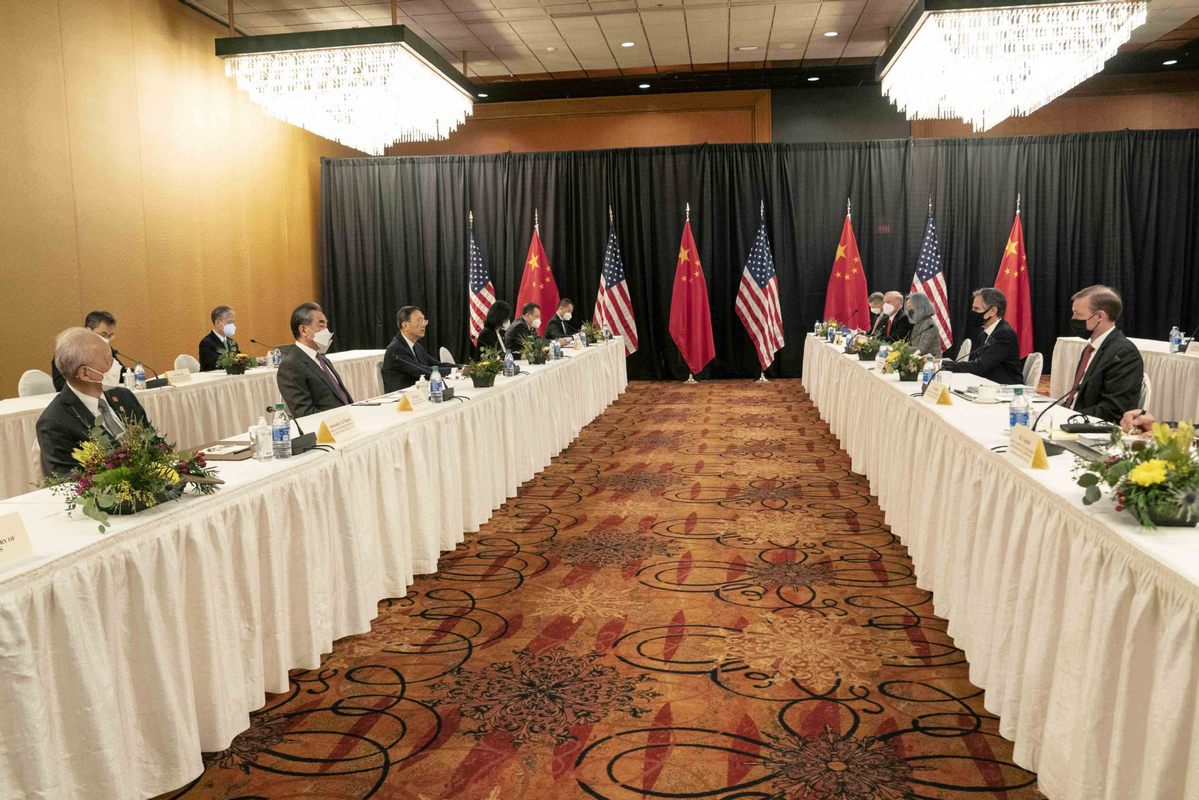
ANCHORAGE, the United States -- China has never accepted and will never accept unwarranted accusations from the United States, said Chinese State Councilor and Foreign Minister Wang Yi here on Thursday.
The United States should quit its old bad habit of hegemonism and completely abandon its overbearing behavior of interfering in China's internal affairs, Wang said at the start of a high-level strategic dialogue with the United States in the Alaskan city of Anchorage.
Noting that Anchorage is located in the middle of the air route between the capitals of China and the United States, Wang called the city a "gas station" for China-US exchanges and an "intersection" for the two countries to meet each other halfway.
In the past few years, due to the irrational suppression of China's legitimate rights and interests, China-US relations have encountered unprecedented difficulties, Wang said, adding that this situation has harmed the interests of the two peoples as well as stability and development of the world, and should stop.
He said the US escalation of sanctions on Hong Kong-related issues on March 17 is a gross interference in China's internal affairs, which has aroused strong indignation among the Chinese people.
It is not a normal way of hosting guests that the United States introduced the sanctions on the eve of the Chinese side's departure for the dialogue, Wang said.
If the United States wants to enhance its so-called advantage over China through the act, it has totally miscalculated as this just exposes the inner weakness and powerlessness of America, the Chinese official said.
This practice will not at all affect China's legitimate position, nor will it shake the firm will of the Chinese people to safeguard sovereignty and dignity of the nation, he added.
Wang said that since the US side mentioned in opening remarks that some countries believed that China coerced them, it should clarify whether such a claim came from those countries or America's own assumption.
If the United States is partial to some countries just because they are its allies, or even takes sides with their wrong words and deeds, it will be difficult for a smooth development of international relations, Wang added.
Emphasizing that the phone conversation between Chinese President Xi Jinping and US President Joe Biden on the eve of the Chinese lunar new year is very important, Wang said the consensus reached by the two heads of state has guided the direction for China-US relations to get back on track.
The international community is paying close attention to the Anchorage dialogue over whether China and the United States can truly show sincerity and goodwill, and whether the two sides can send out positive signals to the whole world, he said.
If the US side is willing, China can work with the United States to exchange views on the basis of mutual respect, take on their responsibilities, and deliver on the tasks they are given, Wang added.
Yang Jiechi, a member of the Political Bureau of the Communist Party of China (CPC) Central Committee and director of the Office of the Foreign Affairs Commission of the CPC Central Committee, as well as Wang, are attending the two-day high-level strategic dialogue with US Secretary of State Antony Blinken and US National Security Advisor Jake Sullivan.
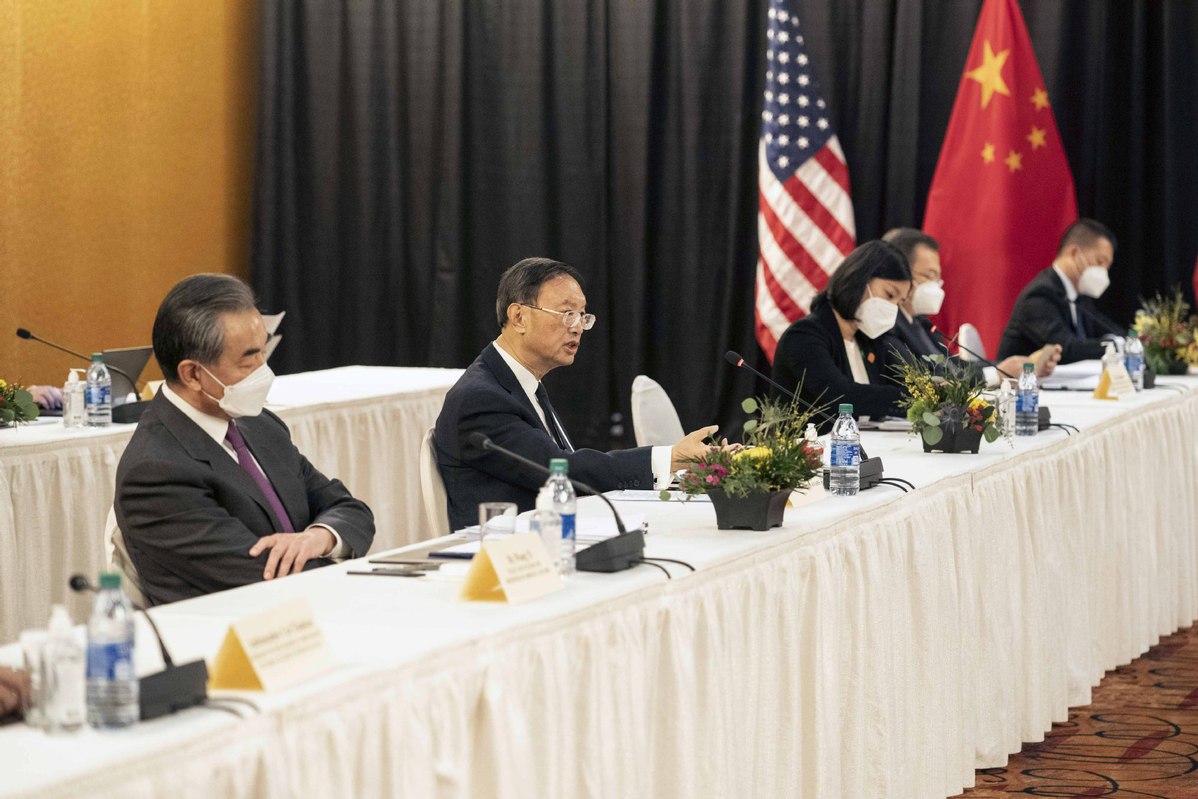
ANCHORAGE, the United States - The United States should stop its interference in China's internal affairs, and avoid confrontation between the two major countries, said a senior Chinese official here on Thursday.
Yang Jiechi, a member of the Political Bureau of the Communist Party of China (CPC) Central Committee and director of the Office of the Foreign Affairs Commission of the CPC Central Committee, made the remarks at the start of a two-day high-level strategic dialogue with the United States in the Alaskan city of Anchorage.
Chinese State Councilor and Foreign Minister Wang Yi, US Secretary of State Antony Blinken and US National Security Advisor Jake Sullivan also attended the dialogue.
Following the opening remarks of the US side, Yang spoke first, emphasizing that on the eve of the Chinese lunar new year, Chinese President Xi Jinping held a successful telephone conversation with his US counterpart, Joe Biden.
Yang noted that the two leaders agreed that both sides should strengthen communication, manage differences and expand cooperation, which is of great significance in guiding the growth of China-US relations in the time to come.
China's attendance to the high-level strategic dialogue at the invitation of the US side in Anchorage is an important step to implement the consensus reached by the two heads of state in their phone talks, and the dialogue was decided by the two presidents personally, Yang said.
The Chinese and American people, as well as the wider international community are looking forward to practical outcomes from the dialogue, he added.
Noting that the Chinese side hopes that the dialogue would be candid and frank, Yang said as major countries of the world, China and the United States shoulder responsibility for global and regional peace, stability and development.
During the just concluded sessions of its national legislature and political advisory body, China adopted the Outline of the 14th Five-Year Plan (2021-2025) for National Economic and Social Development and the Long-Range Objectives Through the Year 2035, Yang said, pointing out that China now stands at a historical juncture where the timeframes of its two centenary goals converge.
China will basically achieve modernization by 2035 and develop itself into a great modern socialist country by 2050, he said.
China has made major strategic achievements in its fight against the COVID-19 pandemic, achieved comprehensive victory in eradicating poverty, and made great historical achievements in building a moderately prosperous society in all respects, he stressed, adding that the Chinese people unite more closely around the CPC Central Committee with Xi at the core.
Yang pointed out that China upholds peace, development, fairness, justice, democracy and freedom, humanity's common values, and stands for safeguarding the international system with the United Nations (UN) at the core and the international order based on international law, rather than the order based on rules formulated by a small number of countries.
Most countries in the world do not recognize that the US values represent the international values, do not recognize that what the United States says represents the international public opinion, and do not recognize that the rules formulated by a few countries represent international rules, said Yang.
The United States has its own model of democracy, and China has its own style, he noted, adding that unlike the United States, which willfully uses military forces, and causes instability and unrest worldwide, China is committed to the path of peaceful development and has made unremitting efforts to promote international and regional peace and development, and uphold the purposes and principles of the UN Charter.
The United States has many domestic problems in areas like human rights, said Yang, adding that what the United States should do is to improve its image and mind its own business, rather than leaving its own problems unsolved, shipping its problems to other parts of the world, diverting attention of others, and making irresponsible remarks about China's human rights and democracy.
Yang added that the CPC's leadership and China's political system enjoy the wholehearted support of the Chinese people, and any attempt to change China's social system is futile.
Yang said China and the United States are both major countries in the world, and share tremendous common interests in fighting the COVID-19 pandemic, resuming work and production and tackling climate change.
He said it is hoped that the US side will change its zero-sum mentality, abandon such wrong practices as "long-arm jurisdiction", and does not abuse the concept of national security to interfere with normal trade between the two countries.
China and the United States should develop good relations with all countries in Asia-Pacific and have common friends, said Yang, adding that this is how the world works in the 21st century.
Noting that Taiwan, Hong Kong and Xinjiang are all inalienable parts of China, Yang said Beijing firmly opposes US interference in China's internal affairs and will continue to make firm responses.
The United States is not qualified to talk to China in a condescending manner, and the Chinese people will not accept that, said Yang, adding that it must be based on mutual respect to deal with China, and history will prove that those who seek to strangle China will suffer in the end.
He said many achievements have been made since the "ice-breaking" of China-US relations, which are accomplished by the joint efforts of people with vision on both sides and are hard won.
Yang also said that the current international situation has witnessed great changes, adding that under the new situation, the two countries must strengthen mutual communication, properly manage differences, strive to promote cooperation and avoid confrontation.
There was an era of confrontation between China and the United States, and China has come through, said Yang, adding that facts have proved that confrontation has no benefits for the United States.
He also noted that Xi has pointed out that China and the United States should be committed to non-conflict, non-confrontation, mutual respect and win-win cooperation, and Biden also said that the two countries should avoid conflict and confrontation with each other.
The two sides should fully and correctly implement the consensus reached by the leaders of the two countries so as to return China-US relations to the track of healthy and stable development, Yang said.
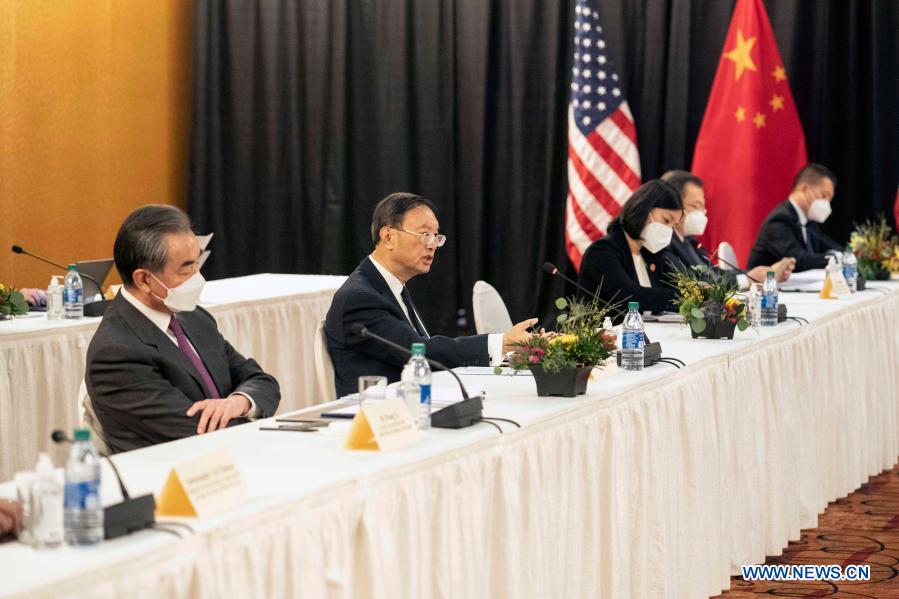
The United States should not be "condescending" in its tone when speaking to China as the Chinese people never buy it, senior diplomat Yang Jiechi said.
Mutual respect is always a basis for dealing with China, Yang, member of the Political Bureau of the Communist Party of China Central Committee and director of the Office of the CPC Central Commission for Foreign Affairs, said on Thursday at the bilateral high-level strategic dialogue in Anchorage, Alaska.
History will prove that any attempt to suppress and contain China will backfire in the end, Yang said.
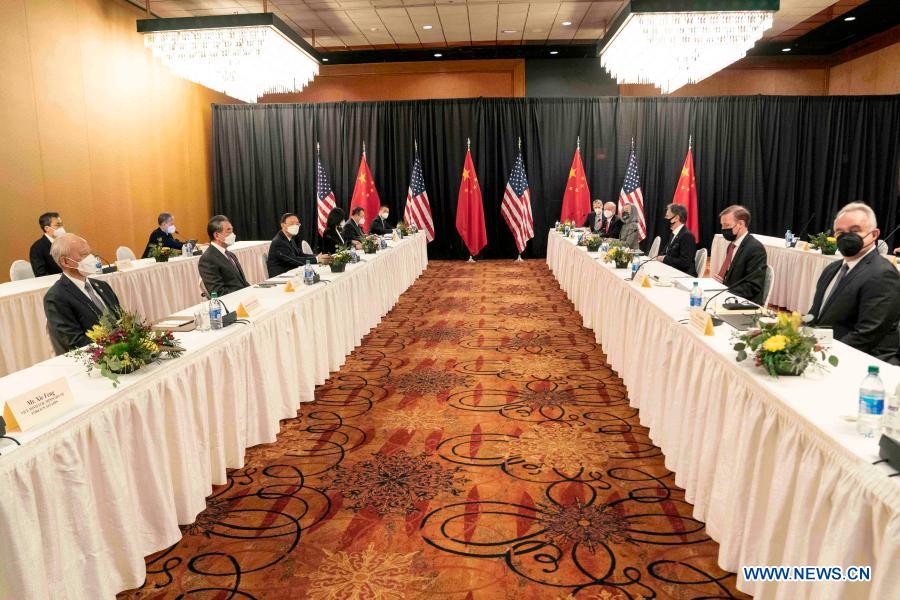
Chinese and US senior officials are holding the second session of a High-level Strategic Dialogue in Alaska.
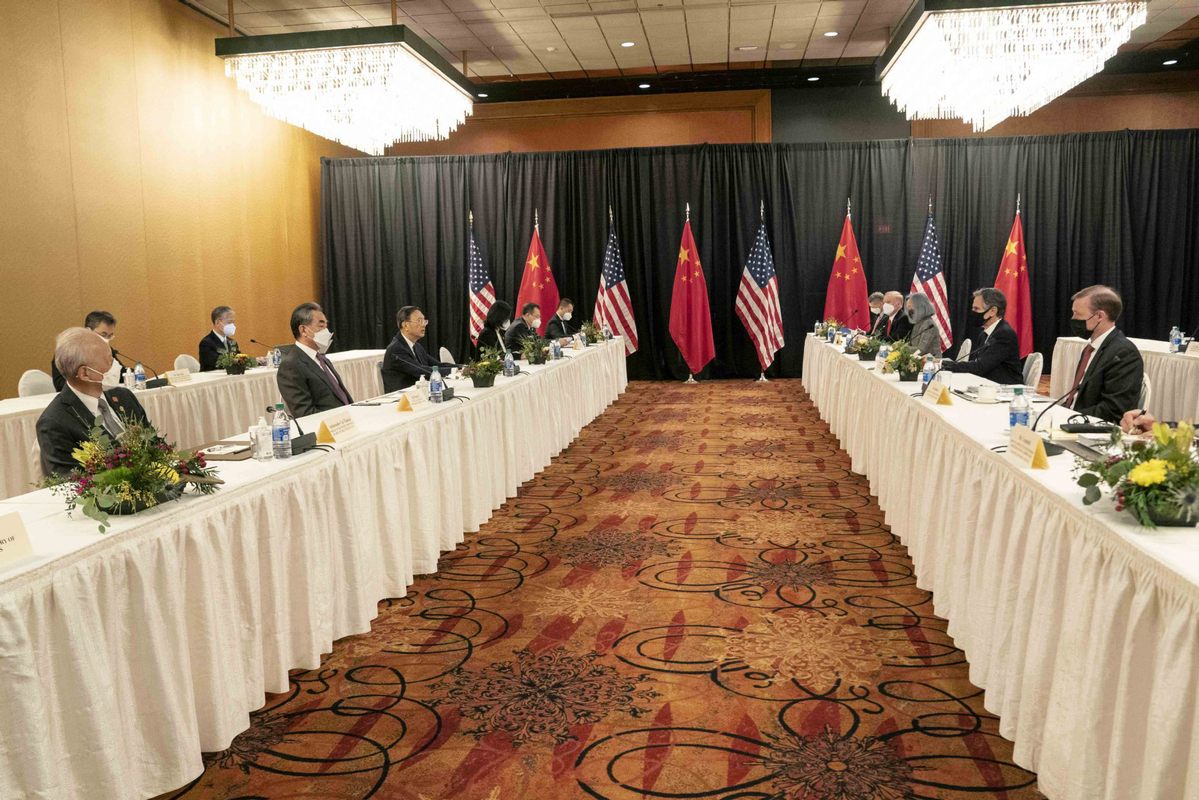
The Chinese side has responded solemnly to "unreasonable attacks" made by the US side at the beginning of the bilateral high-level strategic dialogue in Anchorage, Alaska, an official with the Chinese delegation said on Friday.
The Chinese side, in response to the US' invitation, traveled to Anchorage in sincerity to have a strategic dialogue with the US side, and China finished preparations for the dialogue in accordance with the procedures and arrangements that were agreed to by the two sides in advance, the unnamed official said.
The official pointed out when delivering its opening remarks, the US side went over time and made unreasonable attacks on China's domestic and foreign policies in an attempt to spur conflict.
This is not the way to treat guests, nor is it in line with diplomatic etiquette and protocols, and the Chinese side has made a solemn response to this, the official added.
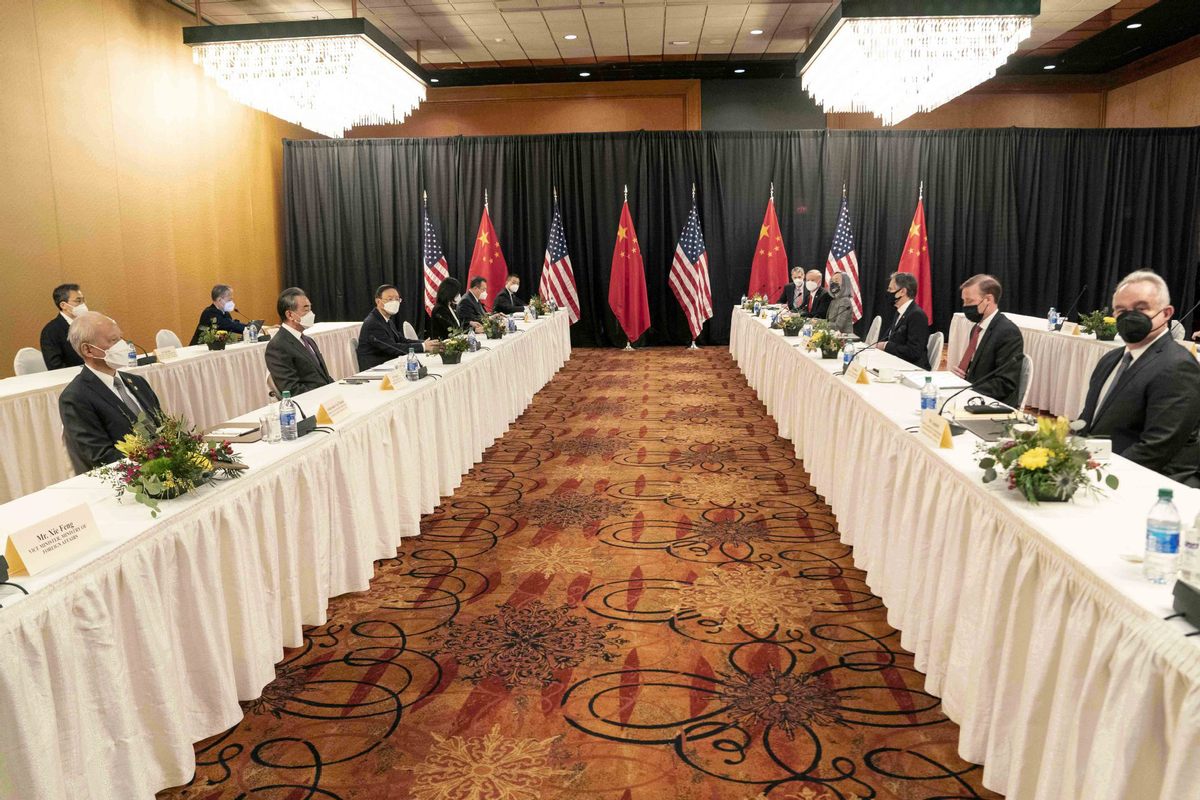
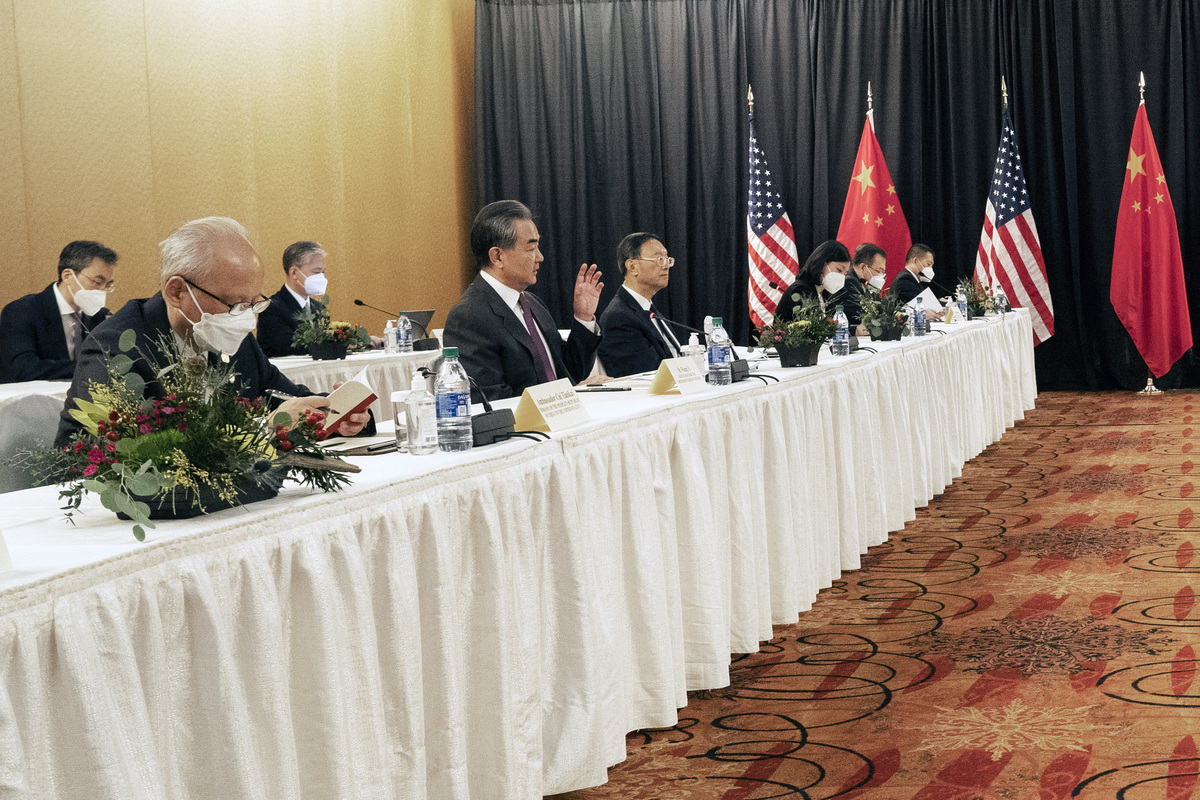
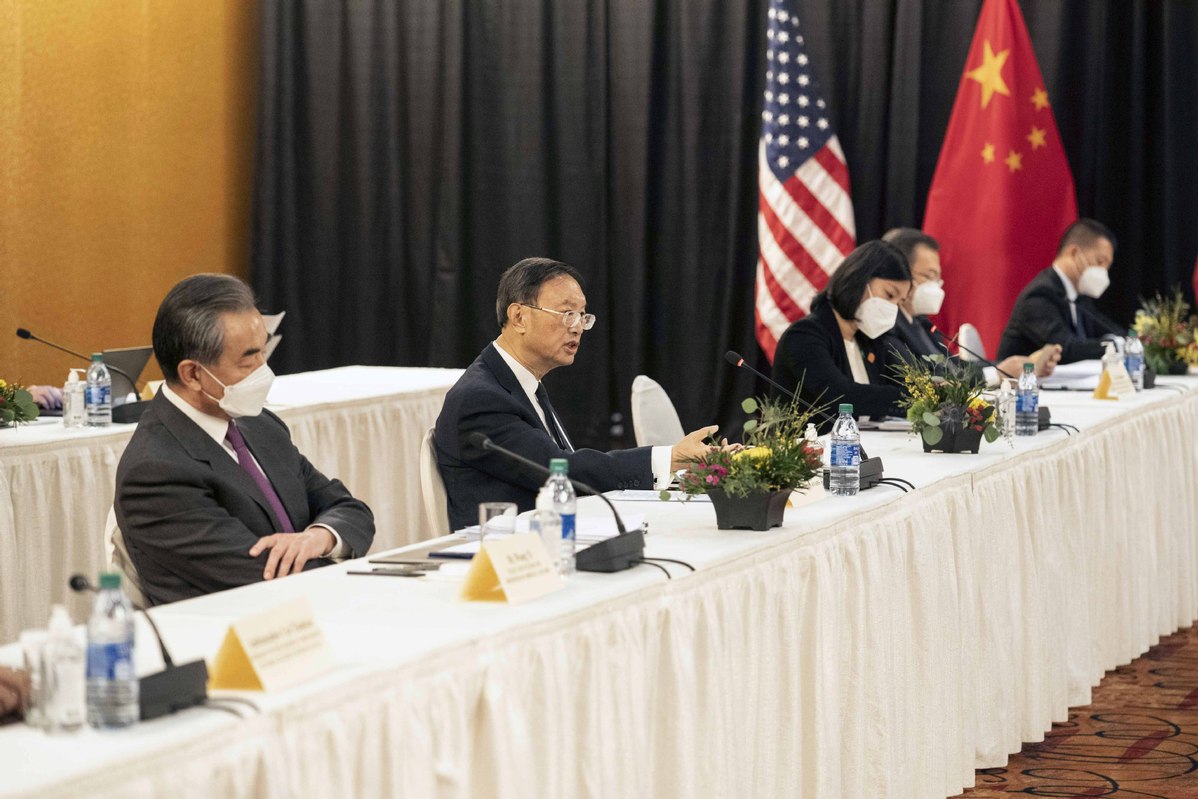
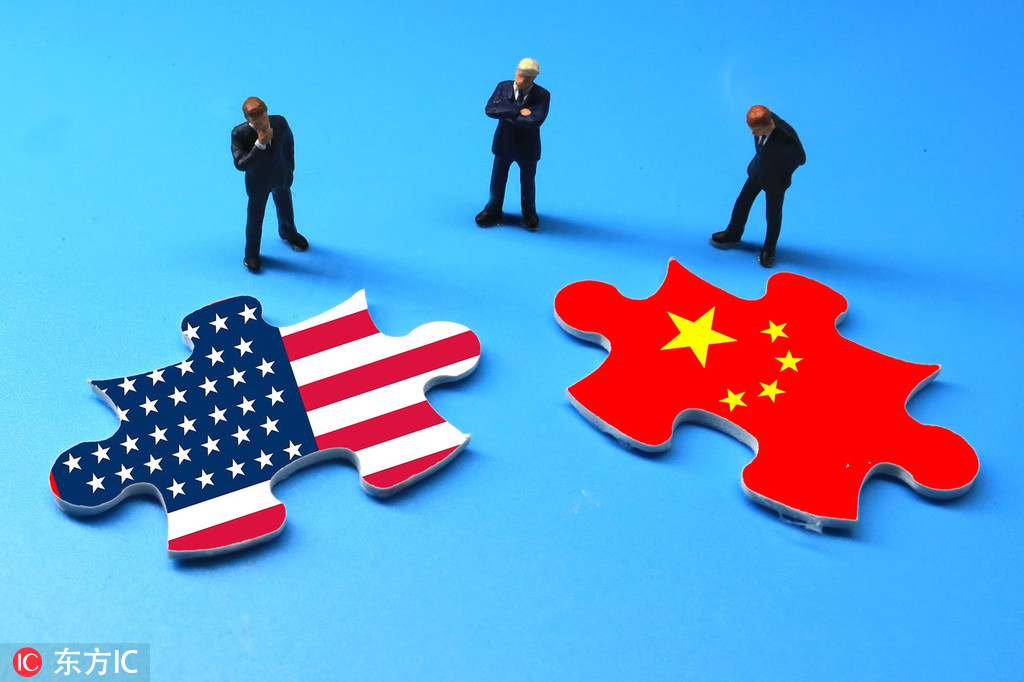
The United States government has been describing China as a competitor for some time.
In November 2017, the Trump administration labeled China a "strategic competitor" in its National Security Strategy and waged a trade war and a tech war against China.
On March 3, the Biden administration issued the Interim National Security Strategic Guidance, which identified China as the US' No 1 competitor and "the only competitor potentially capable of combining its economic, diplomatic, military and technological power to mount a sustained challenge to a stable and open international system."
China begs to differ. It thinks of relations with the US as reciprocal and win-win in the final analysis. Cooperation weighs much heavier in this relationship, though competition does exist.
On March 7, State Councilor and Foreign Minister Wang Yi, in answering a question about China-US relations, said: "It is normal that there is a competitive element in China-US relations as our interests converge. What matters is that the two sides should advocate healthy competition on a fair and just basis for the purpose of self-improvement and mutual enhancement, rather than finger-pointing or zero-sum game. More important, cooperation should be the main goal for both China and the United States in the interest of the two countries and the whole world."
China and the US see competition in a different light. The US regards strategic competition as a zero-sum game, during which rivalry takes center stage and only one winner will prevail. President Joe Biden also said in the National Security Strategic Guidance that the US has one goal in all its current endeavors, which is to outpace China and prevail.
According to the guidance, "the most effective way for America to out-compete China over the long-term is to invest in our people, our economy, and our democracy". The US is bent on beating China, since it sees China as a threat to its values and lifestyle. The guidance also says, "We will also deter Chinese aggression and counter threats to our collective security, prosperity and democratic way of life."
China rejects the idea of a pure zero-sum game. Competition should not aim at containing, weakening or even defeating the counterparty. China and the US can inspire each other and grow together instead of engaging in a zero-sum game.
China envisions a new type of major-country relationship based on mutual respect and win-win cooperation, free of conflicts or confrontations. It holds that different values and ways of life can coexist in harmony and succeed together in a community with a shared future for mankind. When tensions were escalating between China and the US amid former president Donald Trump's all-out confrontations, China proposed a transitional strategy for advancing the bilateral relationship based on coordination, cooperation and stability.
Both China and the US agree that competition should be rules-based, but they approach rules from different angles. The US touts "American exceptionalism "in international affairs and invokes domestic laws in foreign relations at will. China emphasizes that bilateral relations must be built on basic principles and norms of international law that are generally accepted by the international community, rather than unilaterally defined by the US. Competition should be healthy and take place in a fair and just manner.
China hopes that strategic, security and many other domains that necessitate global cooperation will be kept out of the contest. Under Trump, the US gradually expanded its confrontational policies from the trade war to all aspects of China-US relations in a display of "strategic competition".
China and the US differ fundamentally in "competition" strategies. By "strategic competition", the US intends to triumph over China, thus dismissing the notion of win-win cooperation proposed by China. The US believes that China is the sole winner in the status quo and the US the sole loser, while China is convinced that the bilateral relationship is reciprocal and win-win in essence, and cooperation was, is and should be the defining feature.
It doesn't have to be all winning or all losing for China or the US, since each can prosper in its own way and the two can coexist in harmony. As a developing nation at the primary stage of socialism, China lags far behind the US in composite national strength and harbors no intention of challenging the superpower. China believes that in a multipolar world, as it will be in the future, there will be no place for a hegemon and China for sure will be no hegemon in the place of the US.
Competition defined in different ways reflects the competitive dynamics between China and the US. In turn, it will also guide policymaking and affect the future direction of bilateral relations.
With the world still fighting COVID-19, there is arduous work to be done regarding post-pandemic rebuilding, economic recovery and global governance challenges such as climate change and food security.
Meanwhile, the US and China also need to address complex governance headaches at home. It is rational, pragmatic and realistic to adopt more cooperative instead of confrontational policies in the bilateral ties.
The author is director of the Institute of Peaceful Development of the Chinese Academy of Social Sciences. The views do not necessarily reflect those of China Daily.
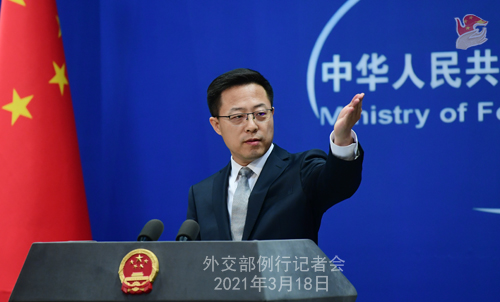
Attempt by Washington to pressure Beijing ahead of meeting called 'futile'
Washington's attempt to roll out "microphone diplomacy", align with allies and pressure Beijing ahead of the China-US high-level strategic dialogue "is futile" and "will make no difference", Beijing warned on Thursday.
Still, China is ready to embark on adequate communication and an exchange of views with the US to push for their ties' healthy growth, Foreign Ministry spokesman Zhao Lijian said at a news conference on Thursday.
Zhao made the comment as senior diplomats of the world's top two economies arrived in Anchorage, Alaska, on Thursday for the meeting scheduled on Thursday and Friday.
The Chinese side is led by Yang Jiechi, a member of the Political Bureau of the Communist Party of China Central Committee and director of the Office of the Foreign Affairs Commission of the CPC Central Committee as well as State Councilor and Foreign Minister Wang Yi.
US Secretary of State Antony Blinken and National Security Advisor Jake Sullivan represent Washington.
Ahead of this key meeting, the US kept pressuring China during its senior officials' recent visits to Japan and the Republic of Korea, and it announced an update of sanctions on China regarding the Hong Kong Special Administrative Region.
At the Thursday news conference in Beijing, Zhao, the spokesman, said that Washington recently came up with a slew of negative words and deeds regarding China ahead of the dialogue, and "the timing is curious".
All the agenda items eligible for discussion are on the table, and during the dialogue, Beijing will make clear its position and concerns, he said, reiterating China's strong will to champion core interests.
"The US should realize China's firm determination to safeguard its own sovereignty, security and development interests," he said.
Joint efforts will decide whether the meeting will yield outcomes or not, and the US should work for the same goal with sincerity and a constructive approach, Zhao said.
Chinese Ambassador to the US Cui Tiankai told Chinese media on Wednesday that both sides attach great importance to the meeting.
"We don't expect to solve all problems in one dialogue, so we don't have unrealistic expectations or illusions," Cui said.
"We hope this can be a beginning, and the two sides will start a process of honest, constructive and rational dialogue and communication. If this can be achieved, the dialogue will already be successful," he added.
In response to recent US moves aiming to win over allies in order to gain a "dominant position" in this dialogue with China, Cui, the ambassador, said, "Just like someone who walks at night alone will sing to help increase courage, but it is not of much use. If you have issues to talk about with China, do it face to face."
He said there are several big question marks in the minds of the global community, including whether the US can truly play the role of a responsible stakeholder in international affairs, whether it is really ready to return to multilateral cooperation, and whether it is willing to respect interests of other countries and listen to the voices of other countries.
"Many countries, including US allies, have such questions. Some just don't say it in public. It is hoped that the US will understand other countries' concerns," he added.
Commenting on Washington's alleged plan to push Beijing for concession on topics such as Hong Kong, Xinjiang and Taiwan during the dialogue, Cui said the US "should give up this illusion, as this attitude will only lead the dialogue to a dead end".
"If someone thinks that China came to snowy Alaska with sincerity this time to make compromise and concession, then I would suggest that my colleagues in Beijing cancel this trip as soon as possible. Why bother to come here?" Cui added.
Jia Qingguo, director of Institute for Global Cooperation and Understanding of Peking University, said resuming high-level contacts and exchanges is a key precondition for stabilizing China-US ties and prevent further deterioration of the ties, and it is already significant for senior officials to sit at the same table to talk on various issues they face.
Although it is seen as unlikely that the two sides will agree on a comprehensive plan for massive cooperation through this dialogue, "the discussion itself lays a foundation for managing differences", Jia said.
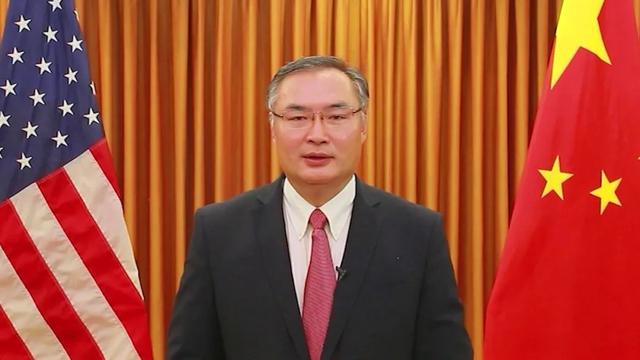
A Chinese envoy on Wednesday expressed hope that the US will remove "unreasonable restrictions on bilateral cooperation" as the two nations entered a new chapter of diplomatic relations.
"We hope that the US side will remove unreasonable restrictions on bilateral cooperation as early as possible and not create new obstacles," said Zhang Ping, China's consul general in Los Angeles.
Speaking at a webinar Wednesday titled "A New Year, A New Vision: China & US Relations" organized by San Diego State University, Zhang noted that 2020 was the most challenging year for the bilateral relationship during which a "political virus" eroded the hard-won achievement of China-US relations.
"We hope the relationship could be repaired and improved and go back to a predictable and constructive track of development, and the two countries could build a model of interaction that focuses on peaceful existence and win-win cooperation. This is also the expectation of all other countries in the world," Zhang said.
The inauguration of the Biden administration brought the relationship to a new crossroad, with new opportunities and challenges, Zhang told the 200 or so attendees made up mostly of students and faculty members.
Moving the China-US relationship back on the right track requires both sides to move in the same direction, to display courage, demonstrate foresight and stay on the right side of history to make the right decisions, he said.
The previous US administration has pursued "misguided" policies toward China by seeing the nation as a major strategic competitor or even an adversary, Zhang said. China has stuck to the path of peaceful development and has no intention of challenging or replacing the US.
China's US policy is stable and consistent. It is prepared to work with the US to move the relationship forward along the track of no conflict, no confrontation, mutual respect and win-win cooperation, the envoy said.
Zhang recognized the existence of competition between the US and China, but he pointed out that the two nations need do not be adversaries. Instead, they should strive to be partners, he said.
"The competition between China and the US should be like competing with each other for excellence in a racing field, not beating each other in a wrestling arena," he said.
"The two sides should advocate healthy competition on a fair and just basis for the purpose of self-improvement and mutual enhancement, rather than finger-pointing and zero-sum competition," the envoy added.
Zhang reiterated that China and the US share many common interests and could cooperate on a wide range of potential areas.
For example, it is estimated that China will import as much as $22 trillion in goods from foreign countries in the next 10 years. That will open up market opportunities to other countries and inject momentum into the world economy, he said. Zhang urged both sides to take advantage of those opportunities to expand practical cooperation.
The trade relationship is very important to both countries. According to Zhang, even during the pandemic, the bilateral trade volume between the two countries grew by more than 8 percent to over $580 billion. China's imports from the US also reached $234 billion, an almost 10 percent increase.
To facilitate bilateral cooperation, the envoy emphasized the importance of avoiding the "national security" concept and to prevent political manipulation, stigmatization and demonization.
Finally, Zhang stressed the need to strengthen subnational cooperation and people-to-people exchanges, which have been key components of US-China relations.
Southern California has long enjoyed close ties with China, which helped to bring tangible benefits to people of both countries, he said.
Before the pandemic hit, there were nearly 100 flights between Chinese cities and Los Angeles every week. At its peak, the number of Chinese tourists visiting Los Angeles reached more than 1 million every year. There were also as many as 40,000 Chinese students studying in Southern California.
In 2019, China was the largest trading partner of California, and most of the investment from Chinese companies has flowed to the Golden State.
He noted that 2021 marks the 50th anniversary of ping-pong diplomacy and former US secretary of state Henry Kissinger's first visit to China.
"We have every reason to believe no matter what challenges the relationship might encounter, so long as we have the support of our two people, the China-US relationship will have a bright future," Zhang said.
It has been said that those who make the fewest mistakes and may expect to prosper most, while following the course to which nature inclines them, act in accordance with the times in which they live.
The United States while certainly acting in accordance with its natural inclinations is doing so as though compelled to forever do what it has done in the past.
Thus, the Joe Biden administration has sought to build a firewall around China, even as it prepares to engage in talks with it.
The first-ever leaders' summit of the four Quad countries — Australia, India, Japan and the US — was held one week before the meeting of senior officials of China and the US in Anchorage, Alaska. And so-called security talks with Japan and the Republic of Korea have been held this week.
The Biden administration is hoping to use coercion and aggression to contain China's autonomy of action. And it is reinforcing these with an orchestrated campaign of character assassination.
But even the US has no defensive shield against the arrow of time. The world is no longer what it was and countries are all too aware that there can be considerable collateral damage from these ploys. The US is destined to be disappointed if it believes that thoughtlessly following a previously successful playbook will produce the same kind of dividend now as it did before.
The Anchorage meeting presents an opportunity for the US to embrace the future, and apply its natural inclinations to the common good. Yet its moves before the meeting display its lack of confidence in being able to adapt to a world in which it is one among many, rather than one above all. And its paucity of wisdom and lack of courage mean that it is seeking the comfort of the familiar by retreating to the past.
Yet its efforts to replay the moves that brought it to preeminence will not force China to bow to its will.
Which means that rather than taking the meeting as an opportunity for it to indulge in its customary navel-gazing, it should take it as the chance to demonstrate that it is willing to be a responsible stakeholder in global affairs.
The US needs to show that it is standing on the right side of history by engaging with China. The world does not want and cannot afford another Cold War. Like the rest of the international community, China does not expect one meeting to resolve all the differences between the two countries. But like them, it hopes it will mark a new beginning.
If Washington can regain its senses and accept that it is impossible for it to step in the same river twice, there is still the possibility that the two sides can have a candid, constructive and rational dialogue.
